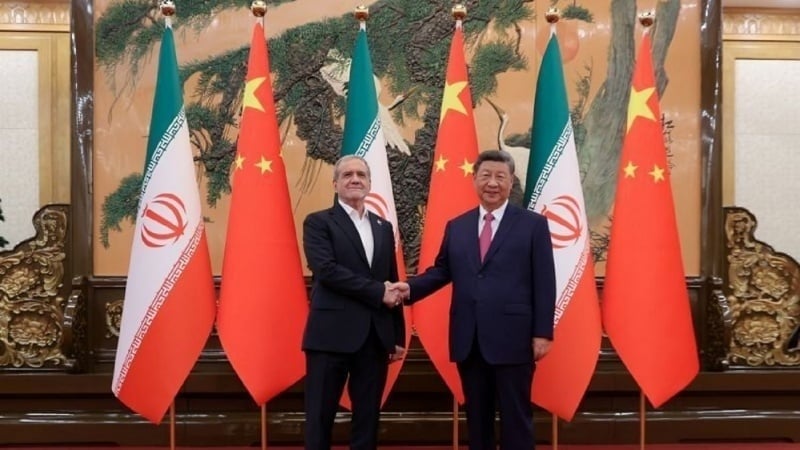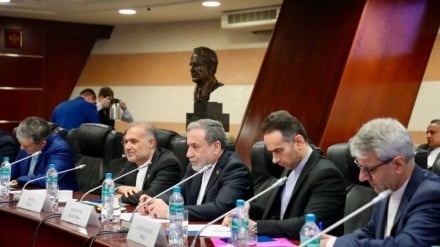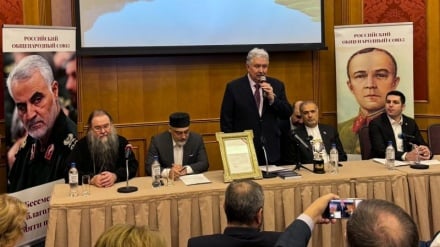Iran-China 25-year comprehensive agreement: A path to overcoming unilateralism
-

Meeting of the Presidents of China and Iran
Pars Today – During a meeting, Masoud Pezeshkian and Xi Jinping, the presidents of Iran and China, highlighted the capacities, opportunities, and mutual determination of the two countries’ leaders to expand cooperation. They emphasized their interest and readiness to elevate bilateral relations with a forward-looking approach, including the full implementation of the 25-year comprehensive agreement between the two nations.
On Tuesday, September 2, the President of Iran told the President of China: “We are ready to cooperate in implementing all the provisions of the two countries’ 25-year comprehensive agreement, and by pursuing the necessary mechanisms, we can place purposeful and intelligent pragmatism at the center of our agenda.”
Pezeshkian added that Iran is prepared to continue close cooperation under any circumstances to elevate Iran-China relations to their fullest potential. He also noted that the United States, in pursuit of sustaining and expanding its unilateralist policies, allows itself to aggress against various countries and now recognizes no limits in this regard.
The President of China, during the meeting, emphasized that China is ready and willing to develop its relations with Iran with a forward-looking perspective. He added that accelerating the implementation of previous agreements between the two countries is feasible, and that China is prepared and eager to expand cooperation with Iran across various fields. Xi Jinping also described any attack on the Islamic Republic of Iran as a clear violation of international principles and legal norms, asserting that force is never a solution to problems.
The President of China added that the Islamic Republic of Iran is a strategic partner, and the two countries must cooperate seriously to strengthen the Shanghai Cooperation Organization in order to counter unilateralism.
Xi Jinping also stated that China remains committed to justice and fairness and recognizes Iran’s legitimate rights for peaceful nuclear use. He noted that, despite U.S. and Western sanctions in recent years, China has created the conditions to continue cooperation and is now ready to expand bilateral relations on a win-win basis in all areas, particularly in transportation and connectivity.
The President of the Islamic Republic of Iran, who visited China at the invitation of his Chinese counterpart to participate in the 25th Summit of the Shanghai Cooperation Organization and Shanghai Plus, as well as the Armed Forces parade commemorating the 80th anniversary of the end of World War II, departed Beijing for Tehran at the conclusion of his visit.
During their meeting, the Presidents of Iran and China emphasized the importance of economic, political, and security cooperation, as well as the implementation of the 25-year comprehensive agreement. The execution of this long-term agreement holds special strategic significance: it is not only a framework for sustained bilateral cooperation but also offers Iran a new path for international engagement amid U.S. and Western sanctions and pressures.
By being located along China’s “Belt and Road” initiative, Iran has the potential to become a regional transit hub. The agreement includes extensive Chinese investments in sectors such as oil, gas, petrochemicals, transportation, infrastructure, and technology. Iran can benefit from China’s financial resources and technology to develop major projects, including high-speed rail and highways.
China has repeatedly expressed its opposition to U.S. sanctions against Iran and has supported Iran’s legitimate nuclear rights. This cooperation can help Iran find alternative economic and diplomatic avenues in the face of Western pressures. China considers Iran a “strategic partner” and seeks to expand relations in all areas, including trade and regional security. This agreement has the potential to elevate bilateral ties toward a lasting strategic alliance.
Iran and China maintain close cooperation within the Shanghai Cooperation Organization, and the implementation of this agreement can strengthen Iran’s role within the organization. The 25-year comprehensive agreement can help Iran pursue sustainable development, economic independence, and global engagement more effectively through broader and deeper collaboration with independent countries.
Pezeshkian’s consultations with the President of China reflect the serious commitment of Tehran and Beijing to accelerate and expand economic, political, and security cooperation—a process that is expected to have significant impacts on regional and global developments.


